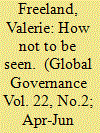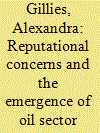| Srl | Item |
| 1 |
ID:
145067


|
|
|
|
|
| Summary/Abstract |
How do we know when a state has been socialized to an international norm? Through a case study of Sierra Leone's Truth and Reconciliation Commission, this article shows that not even voluntary compliance combined with material costs constitutes sufficient evidence of socialization. Highly vulnerable states, equally beholden to international donors and fractious domestic patronage networks, face restricted choice sets. They confront both compliance and overt noncompliance as equal existential threats, and their most important foreign policy goal becomes invisibility; that is, they must avoid attracting international attention. These states behave outwardly like they have accepted the norm's legitimacy, but their actions are rooted in a fundamentally different meaning that blocks socialization and has implications for the state system as a whole.
|
|
|
|
|
|
|
|
|
|
|
|
|
|
|
|
| 2 |
ID:
135069


|
|
|
|
|
| Summary/Abstract |
With the Gulf War as a trigger, Japan began to make a humanitarian contribution by dispatching the Self Defense Forces to United Nations peacekeeping operations. Given Japan's strong hesitation for participation in the past, Japan's peacekeeping policy presents an intriguing challenge to examine the factors for a preference change and sustained compliance. By investigating Japan's peacekeeping policies towards East Timor and Haiti, this article examines how Japan's behavior and preferences were influenced by either internalized norms or cost/benefit calculations. While norm-driven behavior is considered to be incompatible with strategic calculated behavior, the article demonstrates that these two factors can co-exist.
|
|
|
|
|
|
|
|
|
|
|
|
|
|
|
|
| 3 |
ID:
076696


|
|
|
| 4 |
ID:
146640


|
|
|
|
|
| Summary/Abstract |
The Millennium Development Goals guided international poverty reduction efforts from 2000 until 2015 and they will be succeeded by the 2030 Agenda for Sustainable Development, which will be guided by a new set of goals, the Sustainable Development Goals (SDGs). It is argued here that since the process of formulating SDGs, targets, and indicators for their implementation brought together actors with different (and sometimes competing) issue frames, values, and agendas for discussions that clarify the content of norms and their scope, this process can bring about norm contestation and norm change. This article uses an issue that was raised in the context of the SDGs – land rights – to illustrate processes of international norm contestation, evolution, and change. In doing so, it contributes to the growing body of literature that views norms and their content and boundaries as dynamic.
|
|
|
|
|
|
|
|
|
|
|
|
|
|
|
|
| 5 |
ID:
095377


|
|
|
|
|
| Publication |
2010.
|
| Summary/Abstract |
This study argues that the reputational concerns of several high-profile actors drove the emergence of oil sector transparency as an international norm. Thanks to successful advocacy campaigns, developing country oil sector operations began to pose increasing levels of reputational risk to Western governments, international institutions, and corporations. These actors responded to this scrutiny by facilitating the evolution of transparency into a widely cited oil sector "best practice." However, the self-interests of these actors also altered the course of the norm's definition and institutionalization in ways which may constrain its eventual impact on industry behaviors. This study narrates the surprising and rapid spread of the transparency norm in developing country oil affairs, a process which suggests that reputational utility should be considered as a possible explanation for norm emergence.
|
|
|
|
|
|
|
|
|
|
|
|
|
|
|
|
| 6 |
ID:
122998


|
|
|
|
|
| Publication |
2013.
|
| Summary/Abstract |
Is it better to publish or restrict potentially dangerous dual-use scientific research? This question sparked international attention in mid 2011 when two researchers separately sought to publish scientific studies that demonstrated that laboratory-derived strains of the highly pathogenic avian influenza H5N1 virus became capable of airborne transmission after a few genetic manipulations. These findings raised fears that the virus could become easily transmissible among mammals and that rogue actors could use the published information to create a biological weapon. In response, some governments sought to restrict or prohibit the publication of such research. Other actors countered that sharing this information was the best way to ensure national and international safety and security. In this article, I examine the competing demands between public health and national security by examining two dual-use research controversies. This article shows that the best solution to dual-use dilemmas in security-sensitive biological research is to promote an international norm of dual-use awareness. This balances the value of transparent scientific research with dual-use research's potential implications to provide the highest degree of security. Promoting a global norm, cognizant of potential consequences, would allow for scientific research to continue while ensuring that security considerations play a vital role in conditioning the scientific conversation. Such an effort need not be directed by governments; indeed, professional societies could and should take the lead in promoting such efforts.
|
|
|
|
|
|
|
|
|
|
|
|
|
|
|
|